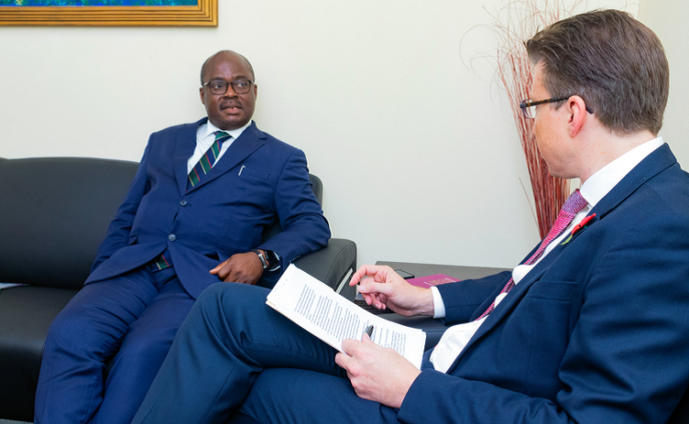The Governor of the Bank of Ghana, Dr. Ernest Addison, has warned that Ghana does not have a choice but to manage a tight fiscal consolidation in an election year.
According to him, the lessons of the economic crisis are fresh on everybody’s mind, and therefore there is the need to keep the currency stable going into the election
Speaking in an interview with Christopher Jeffery of centralbanking.com at the ECCB 40th anniversary and Central Banking Autumn meetings in Saint Kitts and Nevis, he said the central banking financing of the government will remain zero unless otherwise.
“Ghana doesn’t have a choice but to do so, because we have all seen what an economic crisis can do. The lessons are fresh on everybody’s mind. And the need to keep the currency stable is paramount going into the election”.
On independence of the central bank, he said central bank independence is relative, noting, “We have acted independently for most of the time that I have been in office”.
He added “I have not had to consult anybody to set interest rates. The Bank of Ghana is relatively independent. We have an inflation-targeting framework. We have a Monetary Policy Committee that sets interest rates. Independence is all about operational independence. Once you have the structures and the tools to do that, you are there”.
Domestic Debt Exchange Programme
Regarding the Domestic Debt Exchange Programme, the Governor was unhappy the Bank of Ghana took 50% of the haircut, saying, it raise the matter with the International Monetary Fund.
“We were not. We did raise the matter with the IMF. The IMF brought in central bank balance sheet experts to look at our accounts who, by the time they were done, were of the view that despite the haircut, we were policy solvent and we could still operate”.
He said the issue of reviewing the central bank’s accounts would have to be revisited in another three years, adding, “Obviously, this was a time we needed to make progress to ensure the Fund’s board meeting took place. The central bank had become almost the last obstacle to getting Ghana’s programme approved by the IMF. Therefore, it was difficult to spend too much time on further discussions”.
He mentioned that the other parties – pensions funds – were not much affected, adding, “I think they got off relatively easier than they would have if the initial permutations had been followed. We had to take an additional haircut because of that – from 35% to 50%”.
Latest Stories
-
Ghana and Seychelles strengthen bilateral ties with focus on key sectors
3 mins -
National Elections Security Taskforce meets political party heads ahead of December elections
6 mins -
Samsung’s AI-powered innovations honored by Consumer Technology Association
26 mins -
Fugitive Zambian MP arrested in Zimbabwe – minister
44 mins -
Town council in Canada at standstill over refusal to take King’s oath
55 mins -
Trump picks Pam Bondi as attorney general after Matt Gaetz withdraws
1 hour -
Providing quality seeds to farmers is first step towards achieving food security in Ghana
1 hour -
Thousands of PayPal customers report brief outage
1 hour -
Gary Gensler to leave role as SEC chairman
2 hours -
Contraceptive pills recalled in South Africa after mix-up
2 hours -
Patient sues Algerian author over claims he used her in novel
2 hours -
Kenya’s president cancels major deals with Adani Group
2 hours -
COP29: Africa urged to invest in youth to lead fight against climate change
2 hours -
How Kenya’s evangelical president has fallen out with churches
3 hours -
‘Restoring forests or ravaging Ghana’s green heritage?’ – Coalition questions Akufo-Addo’s COP 29 claims
3 hours

